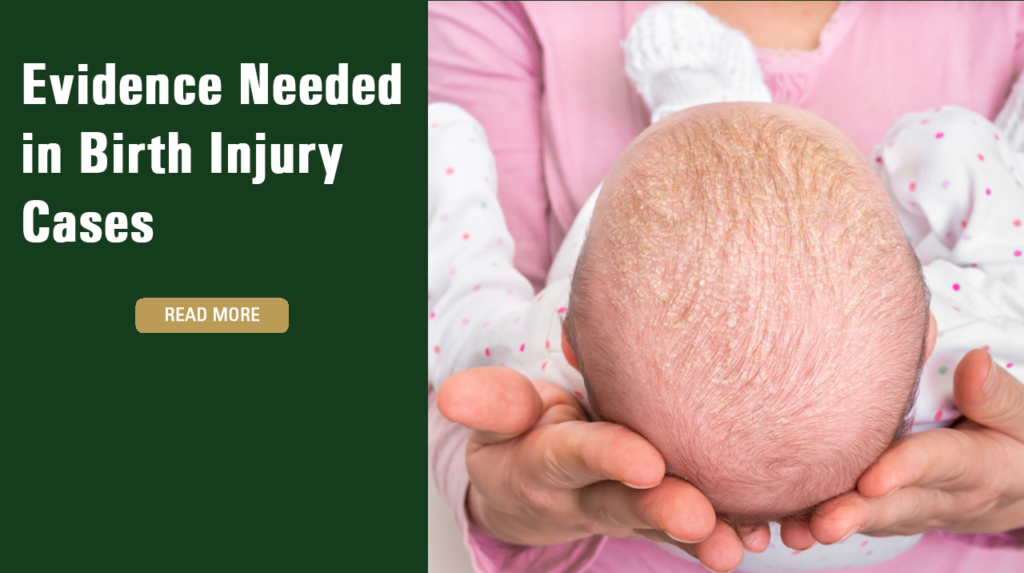Evidence Needed in Birth Injury Cases

Birth injuries can be traumatic for new parents and devastating for both them and their babies. If your child suffered a birth injury because of the negligent actions or inactions of a doctor or another medical professional, you might have the legal right to pursue compensation through a birth injury lawsuit. Proving birth injury malpractice will require you to gather the right types of evidence to prove all of the legal elements. Raynes & Lawn can help you understand the legal merits of your potential birth injury medical malpractice claim and the types of evidence you might need to support it.
Elements Of Medical Malpractice
As the plaintiff, you and your lawyer will need to present evidence proving each of the following elements of malpractice by a preponderance of the evidence:
- Provider-patient relationship existed, giving rise to the provider’s duty of care
- Provider breached the duty of care by providing treatment that fell below the standard of care expected of reasonably competent providers in the area and with similar skills and training
- Provider’s breach of the duty of care caused your baby’s injuries
- Harm caused to your baby resulted in damages
To build a strong case on your behalf, your attorney will fully investigate what happened in consultation with a medical expert. The medical expert will be a doctor with the same type of education and skills who practices in the same area and can review the medical records. The expert and your lawyer will work to determine the appropriate standard of care, whether the doctor’s actions violated it, and whether the negligence caused your baby’s injuries.
The following types of evidence might be necessary in a birth injury malpractice case:
- Medical records during pregnancy, labor, and delivery
- Medical records of your baby’s birth injury and follow-up care
- Any past complaints filed against the defendant professionals
- Eyewitness testimony from others who participated in the delivery
- Expert testimony from life-care planners, economists, pediatricians, anesthesiologists, nurses, and obstetricians
Can You Sue A Hospital For A Traumatic Birth?
In some cases, a hospital might be responsible for a baby’s birth injury when the infant was delivered at the facility. However, holding a hospital liable can be more difficult than the doctor. This is because doctors who practice in hospitals are often not directly employed by the facilities in which they operate. Most doctors who treat patients in hospitals are independent contractors with admitting privileges. This distinction is important because hospitals are vicariously liable for the negligence of their employees but are not vicariously liable for the negligence of independent contractors.
However, you might be able to hold a hospital liable for your baby’s birth injury by proving that the hospital knew or should have known that your doctor was incompetent but still contracted with the doctor and allowed him or her to practice in the hospital. For example, if your doctor had a history of complaints and discipline against his or her license, you might be able to hold the hospital liable through a theory of negligent hiring, retention, or supervision.
If your doctor was a hospital employee, it will be easier to sue the hospital for a traumatic birth injury. Similarly, if your child’s injury was caused by the actions of other hospital employees, including nurses or other staff members, you can file a lawsuit against the hospital to hold it vicariously liable for the actions of its employees while pursuing a liability claim against the doctor directly.
Even when the hospital was not directly negligent for your child’s birth injuries, if its employees were acting within the scope and course of their employment when they negligently caused your child’s injuries, the hospital might be liable to pay for your losses.
Evidence Needed In Birth Injury Cases
The most important evidence in most birth injury claims includes evidence that shows the defendant caused the infant’s injuries through medical negligence. Most birth injury cases allege medical negligence causes of action. You will have the burden of proving the elements of malpractice by a preponderance of the evidence. This means that you will have to present enough evidence to show that it is likelier than not that the defendant’s negligent actions or omissions caused your child’s injuries. A knowledgeable attorney can help you understand the types of evidence you might need to prove your case.
Most birth injury cases will require testimony from multiple experts to prove medical negligence, causation, the injury’s extent and severity, and the likely outcome. An expert will help to establish what the relevant standard of care is and the types of care a reasonably competent doctor would have provided in the same situation. In addition to expert testimony, you will need the types of evidence the experts relied on to arrive at their opinions, including medical records, deposition testimony, diagnostic reports, and others.
In addition to proving the defendant’s liability, you will also be required to present evidence about the losses you have suffered as a result of your child’s injuries and the defendant’s negligence. This type of evidence might include your medical bills, wage statements, and expert testimony about your child’s future needs and the future costs of care. You might also present evidence about the non-economic losses both you and your baby have suffered and might suffer in the future.
Speak To A Birth Injury Lawyer
If your child has suffered a birth injury that you believe was caused by the negligence of a medical professional, you should speak to the attorneys at Raynes & Lawn. We can provide you with a free case evaluation and explain the legal remedies that might be available. Call us today at 1-800-535-1797 to learn more.
For the general public: This Blog/Website is made available by the law firm publisher, Raynes & Lawn, for educational purposes. It provides general information and a general understanding of the law but does not provide specific legal advice. By using this site, commenting on posts, or sending inquiries through the site or contact email, you confirm that there is no attorney-client relationship between you and the Blog/Website publisher. The Blog/Website should not be used as a substitute for competent legal advice from a licensed attorney in your jurisdiction.
For attorneys: This Blog/Website is informational in nature and is not a substitute for legal research or a consultation on specific matters pertaining to your clients. Due to the dynamic nature of legal doctrines, what might be accurate one day may be inaccurate the next. As such, the contents of this blog must not be relied upon as a basis for arguments to a court or for your advice to clients without, again, further research or a consultation with our professionals.


